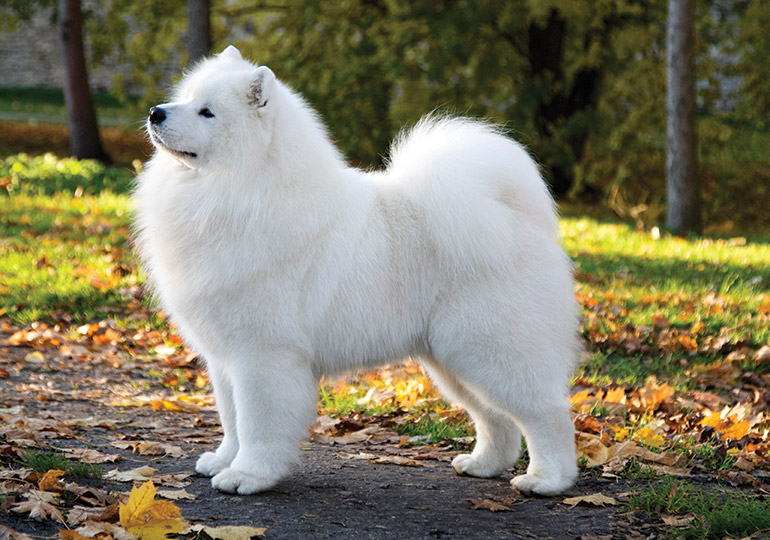
GROUP 6 - Utility
The Samoyed was named after a nomadic Inuit tribe from northern Siberia in Russia, called the Samoyede people. The Samoyede people were a gentle, nomadic tribe of family groups, that were accompanied everywhere by their dogs. They used the Samoyed to herd reindeer, pull sleds loaded with goods, and keep them warm in the frigid Siberian winters. The breed was also used to babysit the Inuit children and was brought into their chooms (or tents) at night to keep the families warm.It was this close bond over thousands of years that made the Samoyed such a people-loving, family-orientated dog.
The Samoyed is actually a rugged, compact working dog of both dignity and grace. It is a double-coated breed with a softer undercoat and a harsher standoffish outer coat. The Samoyed coat can be white, cream or biscuit, or a combination of any of the three. The breed standard describes it as a medium-sized dog of moderate build. Males are larger than females. Females are 45-51cm at the shoulder, the males are 51-56cm.
The Samoyed is charming, intelligent, active and playful through to old age; the breed is amazingly comical, yet thoughtfully sensitive. What sets this breed apart, aside from its magnificent beauty, is its love for all people. It is an exuberant, independent and good-natured dog and the constant companionship with man through the years has given the Samoyed an uncanny human understanding.
It is a highly intelligent breed, which is sometimes confused with disobedience or stubbornness when it comes to Obedience or other types of training.
The Samoyed is a hardy, robust breed, able to survive in harsh conditions, so only a fit and healthy dog survived to be able to breed. This means a lot of common hereditary problems found in Northern breeds are not present in the Samoyed. Hip Dysplasia is one problem that has occurred in the breed, but responsible breeders are aware of the condition and are taking steps to ensure against an increase. Eye problems are virtually unknown among Australian Samoyeds, as are kidney problems and heart conditions. However, they may occur in individual dogs from time to time. Diabetes is another problem that may occur, but usually in older dogs.
The Samoyed’s coat is a thick double-layered hair coat. It is not a fur coat like common breed dogs and thus tends to have fewer allergic reactions. The coat requires little washing even when coated in mud, as after drying, the dirt tends to fall off easily, or with gentle brushing, leaving a white coat underneath.
A Samoyed will only smell if ill, or if the undercoat is left wet for long periods of time. For this reason, when washing a Samoyed it is important to dry the thick undercoat as quickly as possible. A strong hair dryer or dog blower with a good supply of talcum powder is a great investment if you own a Samoyed. You should also be prepared to brush its coat once a week for at least half an hour.
The Samoyed is a comical, intelligent breed, and is happiest at home with its chosen pack. Although highly intelligent, the breed can be diffcult to train. The Samoyed learns tasks easily, but tires quickly of repetitive training, and thus does better with motivation rather than with correction. The Samoyed, like Malamutes and Huskies, is a dominant breed and highly intelligent; if you give it an inch it will take a mile.
However, for those with a sense of humour to cope with this recalcitrant nature and who have the time to groom, the Samoyed is a wonderful family pet. The breed is excellent with children, always loves to play, and has a great, witty sense of humour.
Information from the NSW Samoyed Club
Now you know a little about the Samoyed, you may have think that this is the dog for you. Before you make a decision, please make contact with the breed club or your State controlling body for purebred dogs. They will be able to give you information about available puppies and also suggest dog shows where you can see the breed and speak to breeders. In this way you will gain a better perspective of the Samoyed and its needs and whether this breed would suit your lifestyle.
